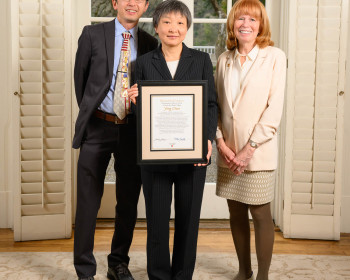The Making of International Law
Open gallery

Lewis & Clark Law School’s International Environmental Law Project (IELP) is in South Africa for negotiations relating to the Convention on International Trade in Endangered Species (CITES). Professors Chris Wold and Erica Lyman, along with four students, are advising governments and non-governmental organizations on strategies for protecting African elephants, white rhinos, tigers, and sharks. They are also actively negotiating rules for trade in bioengineered wildlife products, hunting trophies, and captive bred specimens, as well as the disposal of confiscated specimens. The U.S. Fish and Wildlife Service has submitted a document on the trade of bioengineered wildlife, authored by IELP, for review by the CITES parties. Numerous Lewis & Clark law alums are also at the negotiations.
Judith Needham, a Lewis & Clark LLM alum, recently wrote an article for the Environmental News Service on IELP’s role in advising NGOs and CITES parties regarding bioengineered wildlife products.
IELP professors and students have attended CITES meetings since 2002, providing students an opportunity to engage meaningfully in international environmental lawmaking. Our students work directly with governments, international institutions, and NGOs, putting into practice the skills necessary for a career in international law.
The International Environmental Law Project (IELP) works with governments, non-governmental organizations, and international institutions to develop, implement, and enforce international environmental law to tackle some of today’s most challenging global issues, including climate change, biodiversity conservation, oceans and fisheries and trade and the environment. IELP also trains and educates the next generation of international environmental advocates by providing students at Lewis & Clark Law School with opportunities to participate in international environmental law and policy.
Law Communications is located in room 304 of Legal Research Center (LRC) on the law Campus.
MSC: 51
email jasbury@lclark.edu
voice 503-768-6605
Cell: 626-676-7923
Assistant Dean,
Communications and External Relations, Law School
Judy Asbury
Law Communications
Lewis & Clark Law School
10101 S. Terwilliger Boulevard MSC 51
Portland OR 97219

